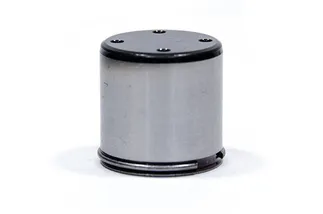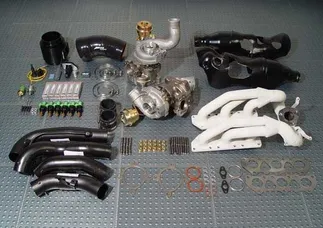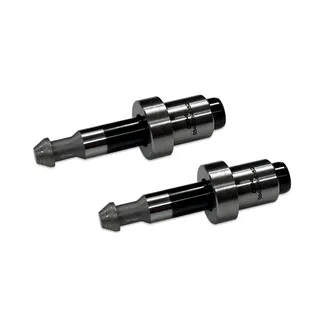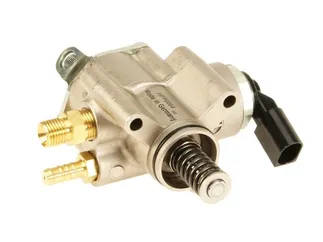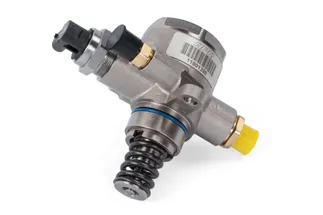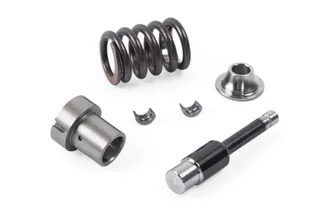Product Information
Overview
The high pressure fuel pump (HPFP) is a cam-driven fuel pump that provides over 1500psi to the direct injection fuel injectors in your engine. As performance modifications are often desired for the 2.0T FSI engines, more fuel is required to support the added horsepower from larger turbos, ECU tunes, and other power-increasing modifications. The IE HPFP works effectively to increase the output of the high pressure fuel system, by using a piston and cylinder that offers 50% more displacement than the factory unit. This combination offers fueling for nearly 600hp at 7500rpm with proper ECU tuning.
Increased displacement
By increasing the bore of the cylinder, we were able to increase HPFP output by 50%. That makes our pump capable of near 600hp at 7500rpm. As you can see on the dyno chart to the right, the factory fuel pump is out of fuel much earlier than the IE HPFP. Although it is capable of over 350hp at 7000rpm, it does not provide nearly that much in the lower rpm range where most quicker-spooling setups see peak power numbers. This is a great upgrade for those looking to do a big turbo setup, or even max out the factory turbo at higher boost levels. Our pump will be perfectly calibrated with any ECU calibration which is tuned for a 9.8MM diameter HPFP piston, which is commonly available.
Consistent diameter piston
With rigorous testing behind this product, we have determined that a consistent diameter piston is absolutely necessary. Many other upgrade kits available use a piston that steps down to smaller diameter. They do this because it allows them to use the original seal and nut assembly. However, doing this means that less than 1/2 of the cylinder is guiding the pin at the top of the stroke. This greatly increases wear, leakage past the pin, and decreases stability of the pin riding in the cylinder. Additionally, using a stepped cylinder causes a pumping action on the bottom side of the piston, which pulses fluid against the shaft seal, increasing the possibility for leakage into the cam follower region. With our consistent diameter piston, as with factory design, there is no displacement change occurring on the bottom side of the piston, so there are no pressure pulses against the shaft seal.
Nitrided piston and cylinder
From the factory, the OEM HPFP includes a nitrided piston and cylinder. This is done to harden the parts significantly, reducing wear and keeping them within wear tolerances. Nitriding is not a coating, but rather a process in which Nitrogen atoms are infused into atomic structure of the outer surface on the component. This increases its surface hardness and wear properties drastically. We have adopted this technology for the IE HPFP as it has proven to be reliable for thousands of miles and cannot chip or flake off like coated components. The thickness and composition of this Nitride layer are independently verified in a materials testing lab for each production batch.
Proprietary alloy
The material that the components are made from is very critical, which is why we chose to use a proprietary tool steel alloy for the piston and pin. The material we use was specifically chosen for its extreme resistance to wear and abrasion. These are critical factors in a system with marginal lubrication provided only by gasoline.
Spring and retainer
In place of the factory steel spring retainer, the IE HPFP uses an ultra-lightweight titanium retainer. Just like a valve spring and retainer, less weight is better, as it reduces the chance of valve float happening. Our retainer was carefully FEA optimized and features a deep weight reduction groove on the outer surface. We also maintain the factory spring, as we have tested them to over 8000 rpm with zero valve float. Other pumps available use an unnecessarily stiffer spring, which puts more pressure on the follower and causes an unnecessary increase in cam follower wear.
Custom seal
The IE HPFP uses a molybdenum disulphide impregnated seal, which increases the stiffness and reduces friction on the seal. Along with this, our custom seals are spring energized to keep them sealing throughout their life with no concern of wearing and leaking. Many of the other HPFP kits on the market reuse the factory seal, which can easily be damaged when the internals are installed. That often causes fuel to leak past the seal and into the crankcase.
Proudly made in the USA
These pumps are manufactured in house, right here in Salt Lake City. Once the components are made, they go through a very strict quality control process before heading over to our clean room for assembly.
FAQ
Will this fuel pump fit my car?
This fuel pump will fit all belt-drive 2.0T FSI engines, which are found in MK5 GTI/Jetta, MK6 Golf R, B6 Passat 2.0T, 8P A3/S3, B7 A4, and MKII TT. The engine codes for these are (but not limited to): AXX, BGB, BPG, BPJ, BPY, BUL, BWA, BWE, BWT, BYK, BHZ, BYD, BZC, CDLA, CDLB, CDLC, CDLF, CDLG, CDMA, and CRZA.
Can I install this pump without any other modifications?
Although the pump is a direct fit, you must have a matching tune to utilize the IE HPFP. Many of the tunes available are for the 9.8MM piston diameter, so our HPFP can be used with any of those.
What is included with the IE HPFP?
The basic IE HPFP kit includes a piston, cylinder, piston seal, retaining nut, titanium retainer, keepers, and detailed installation instructions. If you choose to send your pump in for the rebuild, it will include all of the aforementioned components, along with a profession inspection and assembly into your factory pump housing. The complete new pump includes the same components and assembly from the kit above, but includes a new OEM core pump so it can be installed with minimal turnaround time.
How much power is the IE HPFP capable of?
The IE HPFP offers enough fuel flow for 600hp at 7500rpm, but will ultimately depend on how the car is tuned.
Is there a special break-in procedure required once I install the IE HPFP?
No! We break each and every pump in on our custom fuel pump dyno, which makes for less work for the end user.

